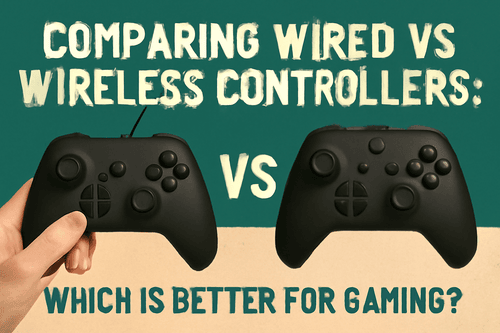When it comes to gaming, the controller in your hands plays a big role in shaping your entire experience and that’s enough reason for you to not take it lightly.
No matter what game it is, the debate between wired vs wireless controllers is never over, dividing the gaming community.
Some gamers swear by wired controllers while others like the freedom and comfort they get from going wireless. Well, both options have their share of pros and cons which need to be compared before you make a choice.
Choosing a gaming controller is not just about staying connected or cutting cords, but how you play and how much you value other factors like latency, reliability, user experience, etc. In this guide, we have compared the two types of controllers, so you can decide which is better for you.
Wired Controller
Wired controllers came first and they are designed to be connected directly to your PC or gaming console using a USB cable. These types of controllers have been around for decades and are still very much in demand mainly because of their simplicity and ease of use. All you have to do is plug them in, and they are ready to go without you worrying about battery running out or wireless signals.
Many gamers prefer wired controllers over wireless ones because they offer a stable, uninterrupted connection which helps them to be more competitive and efficient. Since they are directly powered by the device, there’s no delay in signal transmission, which is especially important when you are engaged in an intense gaming session.
Wireless Controller
Wireless controllers were introduced for convenience because they don’t keep you restricted to a single spot and that’s probably the best thing about them. These controllers use Bluetooth to connect to your gaming device, allowing you to play without being stuck to the console or PC.
What’s even better is that most modern gaming systems, including the Xbox Series X, PlayStation 5, and PCs support wireless controllers.
With these controllers, you enjoy the freedom of movement that you lack while using wired controllers. This makes it an ideal choice for couch gaming or setups where you need to sit at a distance from the screen. Since these controllers are wireless, they come with built-in rechargeable batteries.
Comparison Between Wired vs. Wireless Controllers
A controller is one of the most important things to choose, especially if you are serious about your gaming sessions. While both wired and wireless controllers have their perks and drawbacks, you should choose the one that suits you best. In this section, we will explore what each type of controller offers, along with the key differences that could affect your decision. So, let’s dive in!
- Latency
When it comes to latency, wired controllers steal the show because you can connect them directly to your device; hence the data is transmitted instantly. This is a crucial feature, especially in fast-paced games, where every move matters and even a slight delay can make you lose.
As far as wireless controllers are concerned, they have surely improved a lot over the years, but still cannot beat the wired ones. These controllers are good enough for casual gamers for they may hardly notice the difference. But if you are a serious competitive gamer, using a wireless controller can affect your response times and overall precision, so you must take it into account before making a choice.
- Reliability
In terms of reliability, wired controllers are again the winner mainly because they provide a direct connection. This ensures, there are no signal drops, interruptions, or interference from other devices. Also, you don’t have to deal with disconnections or syncing problems.
With wireless controllers, you can experience signal interference, especially if there are many wireless devices nearby. Though these issues are rare with newer technology, they can still happen and affect your gaming session. Plus, there’s always a risk of you running out of batteries in the middle of gaming.
- Battery Life
You don’t need to worry about battery life when using wired controllers because they draw power directly from the console or PC. With a wired controller, you can play for hours without worrying about charging or replacing batteries and that makes them a perfect choice for long gaming sessions.
On the other hand, wireless controllers cannot operate without batteries, so choosing a model with a better battery life is important. Some models use replaceable AA batteries while others have built-in rechargeable batteries, so it’s up to you to choose. Although this is not a huge hassle, if you forget to charge your controller before a gaming session, you can end up in a frustrating situation.
- User Experience
Wired controllers are simple and often lighter than their wireless counterparts because they don’t have a battery inside. However, the cable can get in the way, especially if you sit far from your screen. Additionally, the cord can limit your movement and get tangled if you are not careful. This can affect your comfort over time and make you want to switch.
As for wireless controllers, they offer more freedom, allowing you to sit wherever you like without being held back by a cable. This makes them great for living room gaming or playing with friends.
- Pricing
Wired controllers are usually more affordable than wireless ones, so if you are on a budget or don’t need extra features, you can opt for a wired controller.
On the other hand, wireless controllers are more expensive mainly because of the battery system and additional features included. However since they offer more flexibility and a better user experience for casual gaming setups, you may want to invest in a wireless model.
Final Verdict
Choosing between a wired and wireless controller depends on how you game. If you are a competitive gamer, a wired controller is a better choice for you. However, if you want a tidy setup and don’t mind charging your device now and then, a wireless controller offers a better experience.

